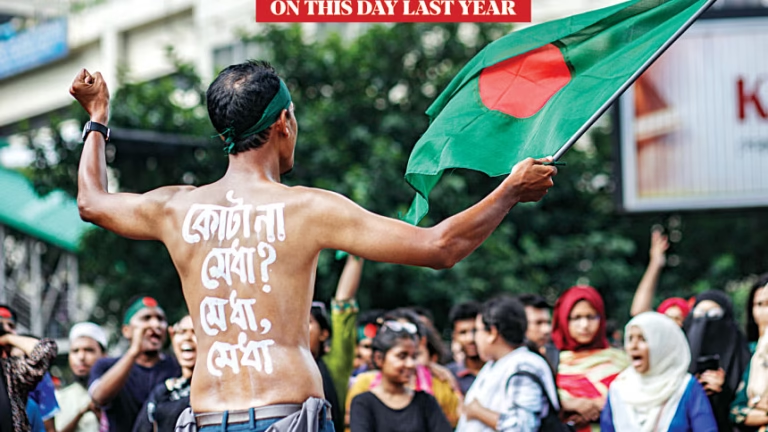The streets of Dhaka and other parts of the country once again echoed with demands for equality as student-led protests intensified, calling for the reinstatement of the 2018 circular that abolished quotas in government jobs.
On July 4, demonstrators under the banner of ‘Boishommobirodhi Chhatra Andolon’ (Students Against Discrimination) held a five-and-a-half-hour blockade at the capital’s Shahbagh intersection, marking the fourth consecutive day of protest. Their demands center around merit-based recruitment and an end to what they call an outdated and unfair quota system.
The protest was triggered by the Supreme Court’s Appellate Division decision earlier in the day, which declined to issue a stay on a High Court verdict that revived the quota system. Instead, the court advised the government to formally appeal after receiving the full text of the ruling. The news, shared rapidly across social media and student networks, galvanized students into action.
By 11:00am, students began gathering in front of the Dhaka University Central Library before marching to Shahbagh. Thousands braved the rain, chanting slogans like “Quota na medha, medha medha” (Quota or merit? Merit, merit) and “Quotar kobor dao” (Bury the quota), demanding a fair and transparent recruitment process.
As traffic came to a standstill from noon to evening, protesters also announced fresh actions, including a mass student procession on July 6 and a countrywide student strike and class boycott scheduled for July 7.
Nahid Islam, a key coordinator, urged the government to reissue the 2018 circular and emphasized that the movement does not oppose freedom fighters but seeks to uphold the spirit of the Liberation War by ensuring equality for all. “The power still lies with the executive branch. We call on the government to act,” he said before the blockade was lifted at 6:10pm.
Though police presence remained heavy, they refrained from direct intervention. Tensions briefly escalated when riot police moved in around 5:00pm, but protesters formed a human chain and the standoff ended without conflict.
The wave of protests extended far beyond Dhaka. Students from Sher-e-Bangla Agricultural University blocked roads in Agargaon, while sit-ins were reported near Ray Saheb Bazar by Jagannath University students. Jahangirnagar University students disrupted traffic on the Dhaka-Aricha Highway, while students at Cumilla University blocked the Dhaka-Chattogram Highway for three hours.
Similar protests unfolded in Rajshahi, Barishal, and Chattogram, with students braving rain and road conditions to press home their demands.
Protesters reiterated a five-point demand: full reinstatement of the 2018 circular, formation of a commission to rationalize quota use, end to repeated use of quota privileges by the same individuals, filling of vacant quota positions with merit-based candidates, and the establishment of a corruption-free, merit-based civil service.
Political tensions surfaced as well. Pro-government Bangladesh Chhatra League activists were reportedly stationed in university dorms to dissuade participation in the protests. At Dhaka University’s Amar Ekushey Hall, a student was allegedly forced to vacate his room due to involvement in the movement, sparking overnight demonstrations by fellow students.
Simultaneously, ongoing strikes by public university teachers and staff protesting the new pension scheme added to the unrest, contributing to the volatile academic and administrative atmosphere.
As dusk settled over Shahbagh, students left the streets with renewed resolve, preparing for larger mobilizations in the days ahead.



